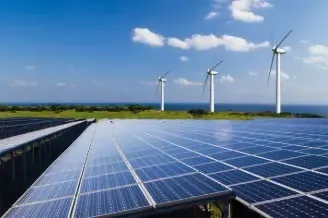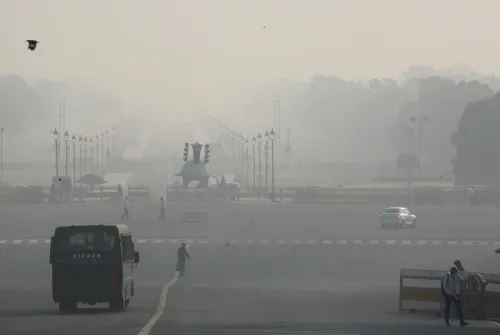Gujarat Allocates ₹165 Crore for Climate Initiatives; Renewable Energy Capacity Hits 32,303 MW

Synopsis
Key Takeaways
- Gujarat's Climate Change Department was established in 2009.
- The state leads India with 12,510 MW of installed wind energy capacity.
- Gujarat's total renewable energy capacity is 32,303 MW.
- 50,000+ students benefited from electric vehicle subsidies.
- New initiatives include Climate Change Awards and further investment in renewable energy.
Gandhinagar, March 20 (NationPress) During the presentation of the Climate Change Department's demands in the Gujarat Assembly, it was emphasized that the state formed a dedicated Climate Change Department in 2009. This initiative not only served as a model for India but also established Gujarat as a leader in Asia.
As per the Renewable Energy Policy-2023, Gujarat has reached a remarkable total installed wind energy capacity of 12,510 MW, making it the top state in India.
Furthermore, the state's installed solar energy capacity has climbed to 17,580 MW, placing it second nationally.
Overall, Gujarat's renewable energy capacity now totals 32,303 MW, ranking it second-largest in the country.
Since 2015, Gujarat has been operating a subsidy program for battery-operated vehicles. Through this initiative, students in grades 11-12 and college students receive a subsidy of ₹12,000 for each electric two-wheeler.
To date, over 50,000 students have availed subsidies totaling ₹58 crore, which have been directly credited to their bank accounts. For the fiscal year 2025-26, ₹9 crore has been allocated to assist 7,500 students in acquiring electric two-wheelers.
To promote environmental preservation, Gujarat has introduced a scheme to upgrade crematoriums.
Currently, more than 9,220 upgraded crematoriums have been installed, with plans to add 1,500 more in 2025-26, backed by an allocation of ₹9 crore. Under the solar rooftop initiative, 3,815 government buildings have been fitted with solar rooftop systems, generating over 65 MW of electricity.
For 2025-26, an allocation of ₹55 crore has been made for an additional 14 MW of capacity.
Moreover, under the CAPEX model, Gujarat has earmarked ₹146 crore in the 2025-26 budget to develop 37 MW of solar rooftop capacity on government properties. As part of the subsidy scheme for institutional biogas plants, 613 plants have been established so far.
For 2025-26, ₹12 crore has been set aside to create 70 more biogas plants across various institutions.
To raise awareness and acknowledge efforts toward climate change solutions, the Gujarat government has introduced the Climate Change Awards in 2023-24, honoring 10 individuals across six categories.
For 2025-26, ₹25 lakh has been allocated to expand the awards to 10 categories.
The 2025-26 Gujarat Budget has set aside ₹165.10 crore for new climate-related projects. This encompasses initiatives for promoting the circular economy, fostering green sector activities, initiating skill development and capacity-building programs, evaluating biomass potential, and developing guidelines for recovering valuable materials from solar and e-waste.
Additionally, ₹25 crore has been allocated for the establishment of a Climate Change Fund, while ₹33 crore has been designated for implementing measures to mitigate the impacts of climate change at the district level and to promote the Mission LiFE initiative.









